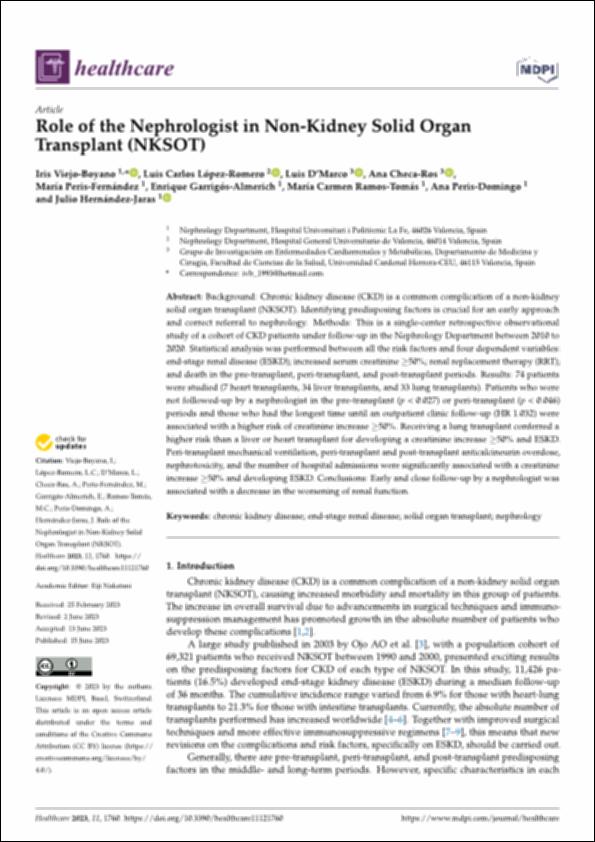Por favor, use este identificador para citar o enlazar este ítem:
http://hdl.handle.net/10637/16170Role of the Nephrologist in Non-Kidney Solid Organ Transplant (NKSOT)
| Título : | Role of the Nephrologist in Non-Kidney Solid Organ Transplant (NKSOT) |
| Autor : | Viejo Boyano, Iris López Romero, Luis Carlos D'Marco Gascón, Luis Gerardo Checa Ros, Ana Peris Fernández, María Garrigós Almerich, Enrique Ramos Tomás, María Carmen Peris Domingo, Ana Hernández Jaras, Julio |
| Materias: | Nefrología; Nephrology; Aparato urinario; Urinary system; Enfermedad; Diseases; Trasplante de órganos; Organ transplantation |
| Editorial : | MDPI |
| Citación : | Viejo-Boyano, I., López-Romero, L.C., D'Marco, L., Checa-Ros, A., Peris-Fernández, M., Garrigós-Almerich, E., Ramos-Tomás, M.C., Peris-Domingo, A. & Hernández-Jaras, J. (2023). Role of the Nephrologist in Non-Kidney Solid Organ Transplant (NKSOT). Healthcare, vol. 11, i. 12, art. 1760 (15 jun.). DOI: https://doi.org/10.3390/healthcare11121760 |
| Resumen : | Background: Chronic kidney disease (CKD) is a common complication of a non-kidney solid organ transplant (NKSOT). Identifying predisposing factors is crucial for an early approach and correct referral to nephrology. Methods: This is a single-center retrospective observational study of a cohort of CKD patients under follow-up in the Nephrology Department between 2010 to 2020. Statistical analysis was performed between all the risk factors and four dependent variables: end-stage renal disease (ESKD); increased serum creatinine ≥50%; renal replacement therapy (RRT); and death in the pre-transplant, peri-transplant, and post-transplant periods. Results: 74 patients were studied (7 heart transplants, 34 liver transplants, and 33 lung transplants). Patients who were not followed-up by a nephrologist in the pre-transplant (p < 0.027) or peri-transplant (p < 0.046) periods and those who had the longest time until an outpatient clinic follow-up (HR 1.032) were associated with a higher risk of creatinine increase ≥50%. Receiving a lung transplant conferred a higher risk than a liver or heart transplant for developing a creatinine increase ≥50% and ESKD. Peri-transplant mechanical ventilation, peri-transplant and post-transplant anticalcineurin overdose, nephrotoxicity, and the number of hospital admissions were significantly associated with a creatinine increase ≥50% and developing ESKD. Conclusions: Early and close follow-up by a nephrologist was associated with a decrease in the worsening of renal function. |
| Descripción : | Este artículo pertenece al número especial "Exploring the Link between Cardiorenal and Metabolic Diseases". |
| URI : | http://hdl.handle.net/10637/16170 |
| Derechos: | http://creativecommons.org/licenses/by/4.0/deed.es Open Access |
| ISSN : | 2227-9032 (Electrónico) |
| Fecha de publicación : | 15-jun-2023 |
| Centro : | Universidad Cardenal Herrera-CEU |
| Aparece en las colecciones: | Dpto. Medicina y Cirugía |
Los ítems de DSpace están protegidos por copyright, con todos los derechos reservados, a menos que se indique lo contrario.


